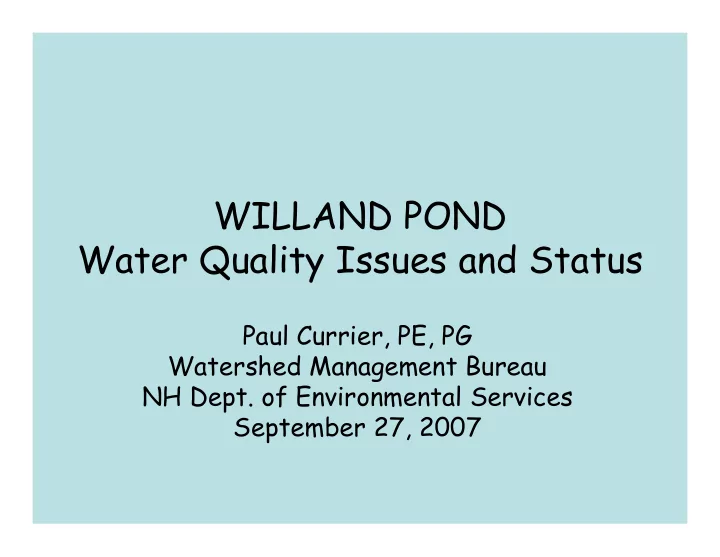

WILLAND POND Water Quality Issues and Status Paul Currier, PE, PG Watershed Management Bureau NH Dept. of Environmental Services September 27, 2007
Surface Water Quality • DES administers Water Quality Standards • Water Quality Standards include – Designated uses: Aquatic life & Recreation – Criteria to support the uses (data/assessment) • NOT JUST CHEMICALS – biology, hydrology, aquatic habitat, microbiology, water level, are all considerations for WQS • DES maintains a catalog of all NH waters • DES assesses all waters for which there are data every 2 years
What’s the process for impaired waters • Willand Pond does not support either aquatic life or recreation: its impaired – See Natalie Landry’s memo – High water level damages aquatic habitat – Cyanobacteria bloom made recreation unsafe • Willand Pond will be on the “impaired waters list” for 2008
Impaired Waters • 1000 or so statewide • Must be restored – DES has enforcement powers – DES also administers a small grant program – Sometimes takes a long time – Best restoration prospects are cooperative projects with local initiatives
Willand Pond’s WQ Problem • Too much water in, too little water out = high water in the Pond • Too many nutrients (mostly P) coming into the pond = higher concentrations in the Pond = good conditions for cyanobacteria bloom
LANDSCAPE CHANGE AND WATER QUALITY
WATER QUALITY CHANGES from DEVELOPMENT • Changed Hydrology – More runoff volume, less infiltration – Increased peak runoff rates • Increased runoff nutrient concentrations – P concentrations can be ~ 5x • Habitat modifications
Post-development runoff Pre-development Flow runoff Pre-development baseflow Post-development baseflow Time
Cyanobacteria Results • 7/12 Pea Soup color (anabaena dominant) – Advisory posted/not OK for recreation • 8/27 cyanobacteria no longer dominant • 9/26 cyanobacteria sparse – OK for recreation
ACTION ITEMS • Cities – Plan and design outlet channel – Implement “no additonal runoff volume and nutrient loading” for site plan review – Monitor Willand Pond – Apply for 319 grant – Begin planning retrofit projects – Educate the public • DES – Technical assistance – Enforcement if appropriate
Recommend
More recommend